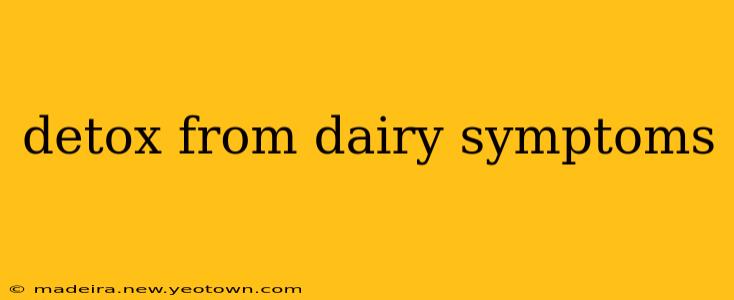Dairy. It's in our coffee, our pasta sauces, even our bread. For many, it's a comforting staple. But for others, it's a source of discomfort, bloating, and more. If you're considering a dairy detox, you're likely already experiencing some symptoms and wondering what to expect. This isn't just about cutting out cheese; it's about understanding your body's response and navigating the potential challenges. Let's embark on this journey together.
What are the Common Symptoms of Dairy Detox?
This is often the first question people have. The experience isn't uniform; everyone reacts differently. However, some common symptoms during a dairy detox include:
- Headaches: Dairy contains substances that can affect blood vessels, and withdrawal can lead to headaches.
- Fatigue: Your body might be adjusting to a new nutritional intake, leading to feelings of tiredness.
- Bloating and Digestive Issues: This is a classic symptom, as lactose intolerance is quite prevalent. Expect some initial bloating, gas, and possibly diarrhea as your body adjusts to not processing lactose.
- Skin Issues: Some people experience a clearing of skin, while others might see a temporary worsening of acne or eczema as their body adjusts.
- Muscle Aches: This is less common but can occur as your body adjusts to the nutrient changes.
- Mood Swings: Many report emotional changes during detox, which could be related to hormonal imbalances or nutrient shifts.
How Long Does Dairy Detox Take?
There's no one-size-fits-all answer here. The timeline for experiencing the full effects of a dairy detox varies significantly depending on several factors, including:
- Your individual sensitivity to dairy: Someone with mild lactose intolerance might experience minimal symptoms, while someone with a severe reaction could have a more challenging time.
- Your overall diet: A diet rich in other nutrients can help ease the transition.
- The amount of dairy you consume: The more dairy you've consumed regularly, the longer it might take for your body to adjust.
Generally, you might experience the most intense symptoms within the first few days to a week. However, it can take several weeks for your body to fully adjust, and for some, the improvements might be gradual and continue for months.
What Happens to Your Body When You Stop Eating Dairy?
When you cut dairy out of your diet, a few key things occur:
- Reduced Lactose Intake: This directly addresses lactose intolerance symptoms for many individuals.
- Potential Reduction in Inflammation: Some research suggests dairy can contribute to inflammation in certain individuals. Eliminating it might lessen inflammatory responses.
- Improved Gut Health: Dairy can disrupt gut bacteria balance. Removing it can allow your gut microbiome to recover.
- Nutrient Shifts: You might need to pay attention to ensuring you're getting sufficient calcium, vitamin D, and other nutrients commonly found in dairy products through alternative sources.
Can Dairy Detox Cause Weight Loss?
While dairy detox might lead to some weight loss for some people, it's not a guaranteed effect. The weight loss is more likely due to a reduction in overall calorie intake or decreased bloating, rather than a direct result of eliminating dairy. If weight loss is your goal, combining a dairy-free diet with other healthy lifestyle choices, including regular exercise, is more effective.
What are the Benefits of a Dairy-Free Diet?
Beyond addressing symptoms, a dairy-free diet offers several potential benefits:
- Improved Digestion: This is particularly true for those with lactose intolerance.
- Reduced Inflammation: Inflammation plays a role in many health problems, and dairy might exacerbate it in some.
- Clearer Skin: Dairy can trigger acne in some individuals, and removing it might improve skin clarity.
- Better Sleep: Gut health is linked to sleep quality, and improving gut health through a dairy-free diet can positively impact sleep.
Is a Dairy Detox Right for Me?
Before embarking on a dairy detox, it’s important to consult your doctor or a registered dietitian. They can help determine if it's appropriate for you, assess any potential nutrient deficiencies, and guide you through the process safely. A dairy detox might not be necessary for everyone. If you experience only mild discomfort, other dietary adjustments or strategies might be more suitable.
This journey toward a dairy-free lifestyle is personal. Understanding the potential symptoms, the timeline, and the benefits will equip you with the knowledge to make informed decisions and feel your best. Remember to listen to your body, prioritize your well-being, and seek professional guidance when needed.

